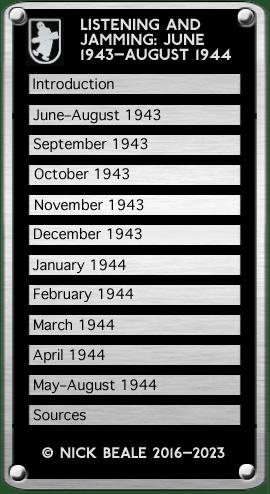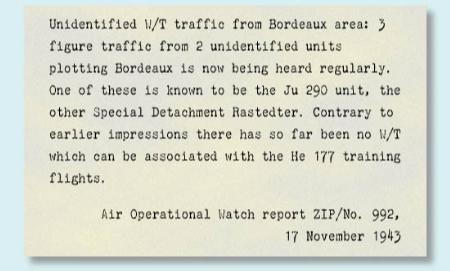|
Hitherto, the Kommando had used III./KG 40’s air-to-ground frequency but changed to another as of 1 November. The normal one-aircraft overnight patrols were flown on the 2nd, 5th, 6th and 7th; the night of 8/9 November saw two He 111 aloft 45 minutes apart whereas just one machine was flying the night after that. The pattern changed entirely on the 10th, leading British analysts to used the report heading “Operations by Special Detachment (?) (Bordeaux)”: a Ju 188 was to operate from 0630–1200 and a Ju 88 from 1800–2315 but no wireless traffic was heard to establish whether they did indeed fly. Meanwhile, at the Werneuchen trials establishment on 3 November, a note had been filed about a three-day visit by two officers to Luftflotte 2 whose Head of Signals, Genltn. Eduard Schützek, had offered his thoughts on tactical signals reconnaissance which were likely as applicable over Biscay as in the Mediterranean theatre: To obtain a clear picture of the effectiveness of jamming and deception of enemy night fighting, ground and air signals monitoring must be linked directly to combat assignments. We must get a point where the results of monitoring and the knowledge derived from them are brought to the attention of the troops after each operation so it can be taken to account on the next. An order went out on the afternoon of the 7th to all U-boats stressing again the value of bringing in prisoners as “the best and most reliable source of intelligence concerning enemy … location gear and methods”, and six days later, those operating in the Atlantic were told that: We have good reason to suppose that enemy air reconnaissance picks up our disposition-lines by methods of location which in part we are still not able to get on to … In the field of radar location, equipment with detection-receiver Naxos and Borkum (as well as Wanze ‘G2’) will ensure radar search, without the drawbacks due to radiation, over all wave-bands so far known to be vital. Search of further wave-bands will be carried out by boats with special equipment.
Evidently three months of special flights over Biscay had not established to the Germans’ satisfaction just how the Allies were able to find their submarines so frequently and so intelligence must be gathered by other means Late on 28 November, Kptltn. Horst Hepp of U-238 transmitted his own piece of PoW information from the Atlantic: Statements by British W/T Operator indicate passive location … He has had two years’ A/S [anti-submarine] training, maintains that with the same location [gear] he can distinguish German U-boat from British submarine. Operational Watch's report for the 13th speaks for the first time of the “‘RASTEDTER’ Special Detachment” (the name revealed by ULTRA, so almost certainly “’Rastedter’ Sonderkommando” in the original), noting that a Bordeaux ground station was active on the unit’s frequency from throughout the small hours and that a Ju 188 “which … may be connected with this detachment” was to start from that aerodrome at 0810 and return by 1400. The next day, it was planned that a Ju 188 should start at 1100 and return around six hours later, this flight being tentatively connected by the British with contact between “K” and Bordeaux early in the afternoon. On 15 November it was the turn of “G” which reported that it was breaking off its mission at 1358 and returning to base. Three sorties were planned for the next day: an He 111 up at 0050; a Ju 188 from 0200–0700 and another from 0600. This last was thought to have been “L” which was called unsuccessfully from 1400–1432. A Ju 88 was operating on the evening of the 17th and an He 111 in the early hours of the next morning. 12 November: After a search in BP 9100/9200 of Spanish fishing vessels suspected of carrying radar, the steamer PANSEMKA is being brought into the Gironde for search. 13 November: Five Spanish fishing vessels were brought into the Gironde for search … numerous further boats were searched at sea. Apart from normal radio sets, nothing was found. War Diary, Kriegsmarine Staff, Operations Division continued on next page …
|
||||


